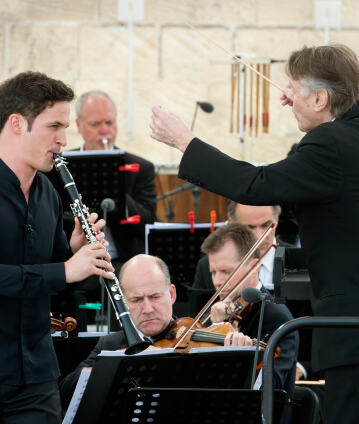2017 Europakonzert from Cyprus with Mariss Jansons and Andreas Ottensamer

The 2017 Europakonzert took the Berliner Philharmoniker to Cyprus, more precisely: to the ancient port city of Pafos. Before the city’s Byzantine castle, the orchestra played works by Carl Maria von Weber and Antonín Dvořák which impress with their lyrical zest and warm colours. The conductor was Mariss Jansons, a close friend of the orchestra for several decades, and the soloist in Weber’s Clarinet Concerto No. 1 was Andreas Ottensamer.
Since its premiere in 1991, the direction of the annual European Concert of the Berliner Philharmoniker on 1 May has mostly been in the hands of chief conductors Claudio Abbado and Sir Simon Rattle. Mariss Jansons, who has had close ties to the orchestra for over 40 years, is one of the small number of guests who have been invited to conduct the concert. Jansons has already conducted one European Concert – in Istanbul in 2001, and now, in the Cypriot port city of Pafos, he conducts a programme of works by Carl Maria von Weber and Antonín Dvořák.
The programme for Pafos includes the overture to the opera Oberon by Weber, plus his First Clarinet Concerto, with Andreas Ottensamer, the young Austrian principal clarinet of the Berliner Philharmoniker, as the soloist. Like Mozart before and Brahms after, Weber’s work for this instrument was also inspired by a major virtuoso of his time: Joseph Heinrich Bärmann, a member of the Munich court orchestra who developed previously unknown playing techniques for the clarinet and advised Weber closely on the writing of the composition. In the concerto, two virtuoso outer movements frame a melancholy Adagio containing an irresistible, chamber music dialogue between the solo instrument and a horn trio.
From its very first performance, Antonín Dvořák’s Eighth Symphony was a huge success. The composition, which never comes across as tragic even in its solemn passages, is full of the spirit of nature, with the principles of movement construction loosened in favour of a more narrative style. The finale, a set of variations based on a simple triadic theme, including in the form of an elegiac cello cantilena, opens with a fanfare on the trumpets and closes with an effective flourish on the same instrument. Any associations with the military are however misguided, as the conductor Rafael Kubelik once explained: “In Bohemia, the trumpets never call to battle—they always call to the dance!”
This open air performance offers impressive views of the harbour-side castle in Pafos, built by the Byzantines and restored after being destroyed by the Ottomans. A member of the EU since 2004, the island Republic of Cyprus is known to classical music fans as the setting for Verdi’s Shakespeare opera Otello, and just off the coast of Pafos according to myth, is the location where Aphrodite, just risen from the sea, stepped onto the mainland. A better patron than the goddess of beauty and love for a concert dedicated to European understanding would be hard to imagine.
© 2017 EuroArts Music International
Categories
Artists
Our recommendations
- 2001 Europakonzert from Istanbul with Mariss Jansons and Emmanuel Pahud
- 2024 Europakonzert with Daniel Harding and Lisa Batiashvili from Tsinandali (Georgia)
- 1996 Europakonzert from St Petersburg with Claudio Abbado
- 2025 Europakonzert from Bari with Riccardo Muti
- Europakonzert 2011 from Madrid with Simon Rattle and Cañizares
- The 1995 Europakonzert from Florence with Zubin Mehta and Sarah Chang